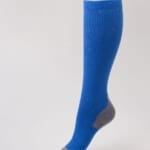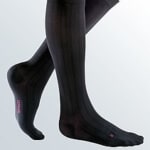Compression socks or stockings used to be what old people wore when they had ulcers, patients post surgery or for long haul flights. Now compression socks are becoming a trend, not only amongst people who stand all day like flight attendants and nurses – but sports men and women and people in 9-5 office jobs.
Compression socks (or stockings) are designed to make veins drain faster and more efficiently. They do this by compressing the calf muscle – therefore pushing blood back up to the heart. By doing this compression socks can help prevent
- Pooling of blood in your lower limbs
- Dull aching, throbbing or itching at the end of the day
- Swelling
- Blood clots forming in your lower limbs – which could travel towards your heart and become life threatening
What makes a compression sock different to a normal sock? Compression socks are made from a special snug elastic hosiery weave that gently squeezes your leg. You will find with compression that they feel tighter around your ankle and get looser as they go up your leg. Compression of the calf muscle – helping your blood return to your heart, is what makes a compression sock different to a normal sock.
When should you consider compression? There are many situations such as tired, aching, itching legs, patients with varicose eczma or ulcers, patients post surgery, if you stand or sit all day and or phlebitis (inflammation of the skin). Compression should also be worn for long haul travel – on planes, trains, buses or cars. We take a closer look at the following 5 situations when compression is recommended:
- Exercise: Although studies show little or no effect on performance, some athletes swear by them during and after exercising – evidence shows that compression helps with a faster recovery time and less muscle cramps.
- Varicose Veins and Spider Veins: This may indicate poor circulation – otherwise known as venous insufficiency. Click here to learn more about signs, symptoms and treatments. Compression socks or stockings are recommended to ease symptoms caused by varicose veins. After varicose vein treatment compression is prescribed by our two SVH surgeons, Dr Lupe Taumeopeau and Mr. JK Wicks. We ask patients to wear compression socks after a vein procedure for 10 days. After this they can be kept and used again for say long haul travel.
- Pregnancy: We recommend compression from the 2nd trimester. Being pregnant can impact your legs, causing swelling , cramps or aching etc. Compression socks will help ease these symptoms. Compression does not harm your baby during pregnancy.
- Can diabetics wear compression socks? Anyone diagnosed with diabetes is more at risk of developing venous insufficiency, swelling and or a DVT. Compression socks can help to maintain a proper circulation in the lower limbs. Diabetics can have problems with their feet and or arterial circulation. We recommend you talk first with your doctor before purchasing and wearing compression socks.
- Deep Vein Thrombosis (DVT): This is a blood clot inside a blood vessel, obstructing the flow of blood through your circulatory system. We recommend compression socks to prevent DVTs and for use when a patient has a DVT or PTS (post thrombotic syndrome). A clot can be life threatening and although compression cannot break this down it can help to promote circulation, decrease swelling and blood pooling. Compression can go a long way towards maximizing your health.
Types of compression socks and stockings: There are three different types of what is called gradient or graduated compression socks or stockings. Grade 1-3 have different pressure at the ankle. You will be prescribed the appropriate grade (by our specially trained stocking consultant, vascular nurses or surgeon) depending on the reason for wearing them. Most commonly at SVH we prescribe Grades 1-2. We offer a varied selection of knee high and thigh high compression socks and stockings in breathable fabrics. We stock an extensive range of plain and patterned compression stockings and socks suitable for your lifestyle.
We offer a FREE custom fitting with one of our friendly trained staff. Click here to book an appointment today.
- patterns
- sports
- everyday


